 Petzlover
Petzlover Chantilly/Tiffany is originated from United States but Japanese Bobtail is originated from Japan. Both Chantilly/Tiffany and Japanese Bobtail are of same weight. Both Chantilly/Tiffany and Japanese Bobtail has almost same life span. Both Chantilly/Tiffany and Japanese Bobtail has same litter size. Both Chantilly/Tiffany and Japanese Bobtail requires Low Maintenance.
Chantilly/Tiffany is originated from United States but Japanese Bobtail is originated from Japan. Both Chantilly/Tiffany and Japanese Bobtail are of same weight. Both Chantilly/Tiffany and Japanese Bobtail has almost same life span. Both Chantilly/Tiffany and Japanese Bobtail has same litter size. Both Chantilly/Tiffany and Japanese Bobtail requires Low Maintenance.
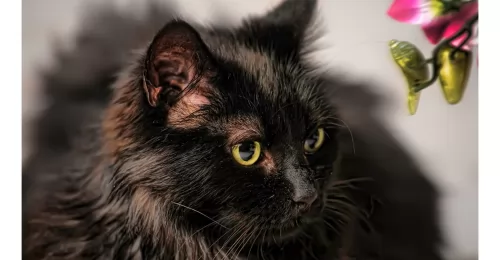 The beautiful Chantilly/Tiffany cat gets people thinking the cat is a semi-longhaired Burmese, but of course, it's not.
The beautiful Chantilly/Tiffany cat gets people thinking the cat is a semi-longhaired Burmese, but of course, it's not.
The way the Chantilly came about was that there were a pair of chocolate-colored cats but their origins were unknown. The first litter of Chantilly kittens was born in New York in 1969 and people were so taken up by the beautiful kittens that a breeding program was started.
The cat was first started as a foreign longhair and then it changed to Tiffany. In a British registry, a cat breed that was a cross between a Chinchilla Persian and a Burmese was named the Tiffanie and renamed Chantilly and referred to as the Chantilly/Tiffany.
The breed is recognized by most major cat registries.
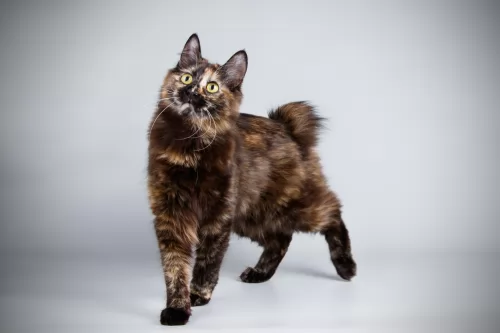 It is believed that these naurally-occuring short-tailed domestic cats in Japan arrived from the Asian continent about 1 000 years ago.
It is believed that these naurally-occuring short-tailed domestic cats in Japan arrived from the Asian continent about 1 000 years ago.
It was way back in 1602 that the Japanese authorities made it that all cats be released to tackle the rodent problem that were threatening the nation's silkworm population.
Bobtail cats were the street cats of Japan. In 1968, the cat was imported to the Western Hemisphere from Japan and in 1976 the shorthaired Japanese Bobtail was accepted for Championship status in the Cat Fanciers’ Association.
There are a number of cat’s breeders in North America and Europe, but it is still a rare cat. Today, the Japanese Bobtail is a recognized breed by all major registering bodies.
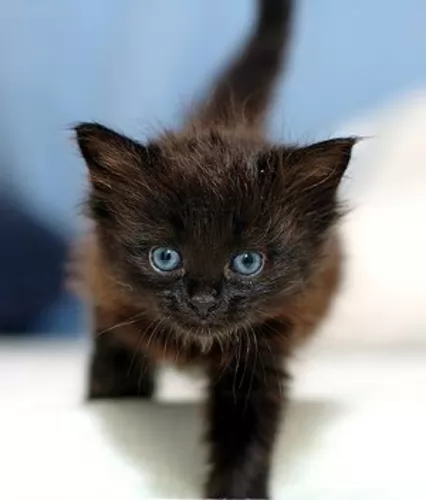 The cat has a fairly broad head with widely spaced ears of medium size. The eyes are oval-shaped and gold in color. The fur is semi-long and there is no undercoat. The tail is plumed.
The cat has a fairly broad head with widely spaced ears of medium size. The eyes are oval-shaped and gold in color. The fur is semi-long and there is no undercoat. The tail is plumed.
Apart from the original chocolate brown of the cat, other colors of the coat can include fawn, cinnamon, black, lilac and blue, with the chocolate brown being the favorite color.
The Chantilly promises to be a devoted and loyal feline companion for you, much preferring the company of his human family than to being alone.
It gets on well with other pets in the house as well as with respectful, gentle children. He isn't a demanding cat and he tries to talk with his family by chirping. It’s a balanced cat, with a fair share of docility and energy, making the cat an ideal companion for single people, couples, families, and elderly people.
It’s a cat that is so devoted, it will follow his human family around the house.
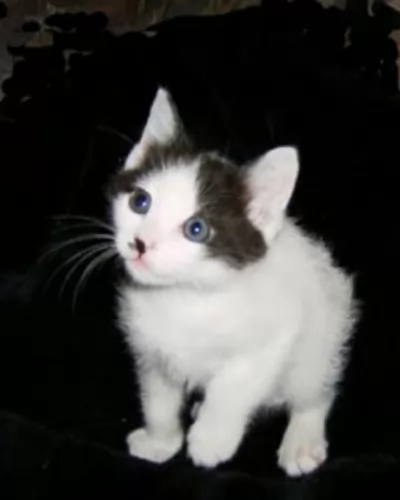 The medium-sized, long, lean and muscled Japanese Bobtail, with long slender legs, is known for its unusual bobtail. People liken the tail to that of a rabbit. The tail must always be visible though.
The medium-sized, long, lean and muscled Japanese Bobtail, with long slender legs, is known for its unusual bobtail. People liken the tail to that of a rabbit. The tail must always be visible though.
The head has a triangular shape and the neck is neither too long or too short. The ears are upright and set wide apart. The oval-shaped eyes are large.
The hind legs are longer than the front legs. The cat weighs between 3 and 6kg and comes in almost any color and pattern but it is thought that the triple-colored ones are the most favored in Japan.
The coat is of medium length and is soft and silky. The head of the cat is triangular with the ears being large and wide apart. The eyes are large and oval-shaped.
The Japanese Bobtail makes a good feline pet for families. They get on well with children and are affectionate and loving with all their human family members.
They’re talkative cats too, enjoying communication with people and using soft noises. It’s an intelligent cat and one that happens to love water too, and is a playful cat, making a great loyal companion.
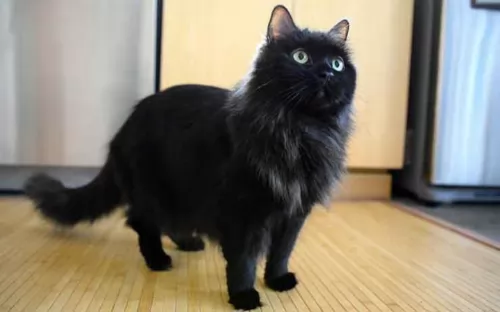 The Chantilly/Tiffany is a gentle and kind breed that is playful and easy-going. They are just your typical middle-of-the-road cats that are not too much or too little of anything.
The Chantilly/Tiffany is a gentle and kind breed that is playful and easy-going. They are just your typical middle-of-the-road cats that are not too much or too little of anything.
The Tiffany is playful, docile, happy and content and he wants to be your friend and companion.
If you are looking for a breed of cat that is loyal to its human family, allow this cat into your home... you won't have any regrets.
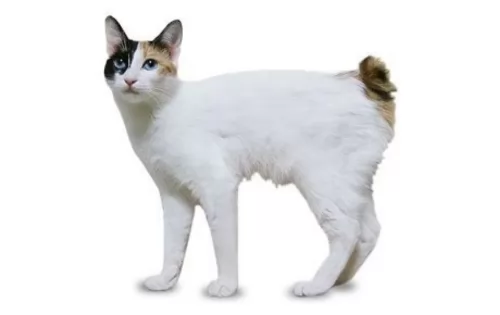 The Japanese Bobtail is such a sweet, playful, loving cat. The cat loves to be with his human family and is highly intelligent.
The Japanese Bobtail is such a sweet, playful, loving cat. The cat loves to be with his human family and is highly intelligent.
They are quite capable of learning tricks and playing games much like a dog. They are social cats and while they aren’t lap cats, they seek out the company of their human family, making use of a soft voice to communicate.
They’re such sweet cats and are adored by those who have brought them into their home as a pet and friend.
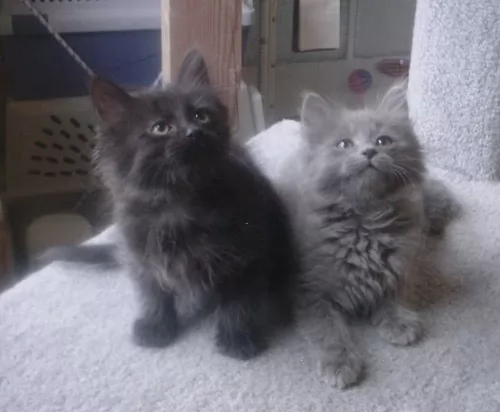 There is no health issue that the Tiffany is prone to. Like any cat, a healthy diet will keep the Tiffany healthy for years.
There is no health issue that the Tiffany is prone to. Like any cat, a healthy diet will keep the Tiffany healthy for years.
These cats are known to have delicate digestive systems so avoid foods with grain if possible. The Tiffany has full hair in their ears, and wax build-up can occur so the inside of his ears must be checked. Checking the ears once a week, as part of a regular routine that includes brushing, and tooth care, should be sufficient to keep the ear canals clear.
Other issues, which are not detrimental but should be kept in mind, are reports that the Tiffany has delicate digestion. This cat relies on a regular diet that doesn't chop and change often.
Because the Tiffany is a low-shedding cat, it is thought to be a popular breed with those people who are allergic to cat hair.
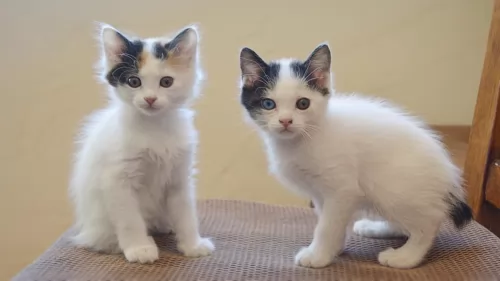 Just like any other cats, the Japanese Bobtail suffers from any one of the different health problems there are. The Japanese Bobtail is a healthy cat generally and he can easily reach 15 years of age with good care.
Just like any other cats, the Japanese Bobtail suffers from any one of the different health problems there are. The Japanese Bobtail is a healthy cat generally and he can easily reach 15 years of age with good care.
Look out for obesity. Obesity comes with a host of health issues, putting a strain on the cat’s joints as well.
You want to manage your furry friend’s food portions to ensure he remains lean and muscular. Feed your adult cat twice daily. Discover what your cat likes in terms of dry cat food, semi-wet or wet cat food.
Your cat is a carnivore and requires quality meaty foods. The best, high-quality cat foods always have meat at the top of the ingredients list as they need meat to get all the right nutrients in.
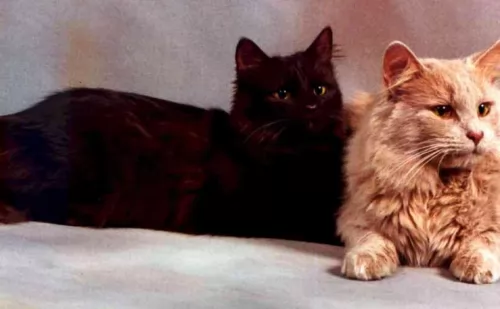 The Chantilly needs an excellet diet and exercise to ensure he doesn’t become to overweght. Remember that cats are carnivores, and this means they have nutritional requirements that can only be met with meat – they can never do well on a diet high in carbohydrates and will develop digestive problems. Your cat will also require clean, fresh water aroud thd clock to ensure his good health.
The Chantilly needs an excellet diet and exercise to ensure he doesn’t become to overweght. Remember that cats are carnivores, and this means they have nutritional requirements that can only be met with meat – they can never do well on a diet high in carbohydrates and will develop digestive problems. Your cat will also require clean, fresh water aroud thd clock to ensure his good health.
Ensure each cat you have has a litter box andencourae good litter box habits by cleaning th litter box every day. Keeping the litter box clean also alerts you anything unusual with your cat’s toilet habits.
Provide your cat with a scratching post and a climbing tree.
The cat doesn’t have an undercoat and is therefore easy to groom. With his semi-long hair, you can brush him once a week to keep the coat soft and shiny. The coat is also low shedding.
Check inside his ears and inside his mouth to ensure there is no redness and signs of infection.
Schedule regular vet visits for your cat for his cat vaccines and for when he is sick.
Spay or neuter your cat to prevent unwanted kittens. Spaying and neutering prevents uterine infections and certain cancers in the felines.
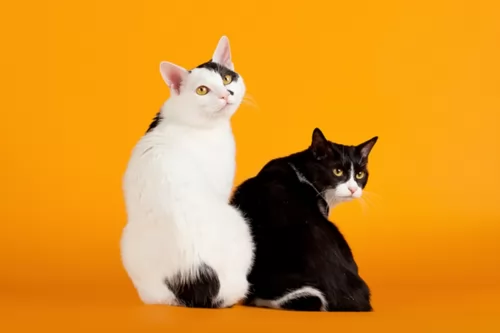 The cat’s medium coat sheds moderately, and a brush once a week to remove the loose hairs will be sufficient. You’ll want to brush him more often during his shedding seasons.
The cat’s medium coat sheds moderately, and a brush once a week to remove the loose hairs will be sufficient. You’ll want to brush him more often during his shedding seasons.
Help with keeping your Japanese Bobtail clean by scooping his droppings out of the litterbox at least every day and also changing the litter at least every week.
When you bring your Japanese Bobtail kitten home, you’ll have to take him to the vet. This is because from 8 weeks of age your kitten will need to get his first vaccines. Booster vaccines for your cat will also be required later on.
Provide your cat with a scratching post to prevent him from scratching your furniture.
Never leave your Japanese Bobtail without a constant supply of fresh, cool water.
Wash your cat’s water- and food bowls every second day to prevent bacteria from building up.